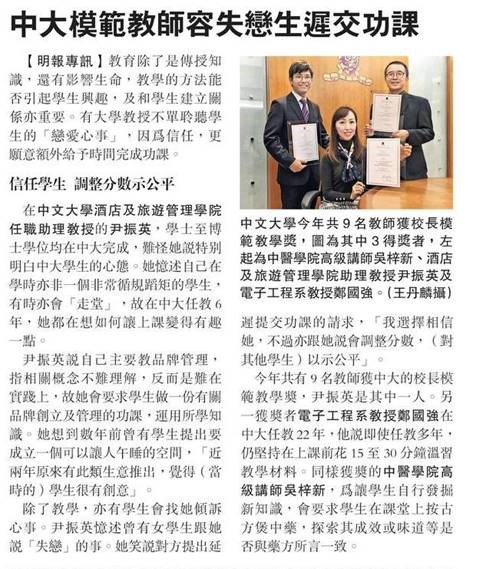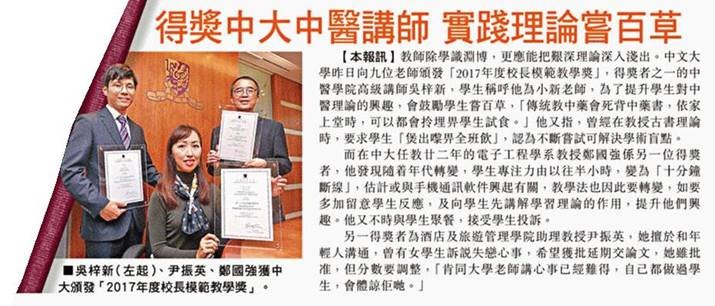Homepage
Home
Prof. K.K. Cheng Michael has been awarded the Vice-Chancellor’s Exemplary Teaching Award 2017.
For details, please click the following link:
HK01
Ming Pao Daily News
Oriental Daily News 
Congratulations!
Prof. XU, Jianbin from the Department of Electronic Engineering, The Chinese University of Hong Kong (CUHK), has been elevated to Fellow Grade of the Institute of Electrical and Electronics Engineers (IEEE) since 2018. He is being recognized for his contributions to nanoscale electronic materials and devices.
The IEEE Grade of Fellow is conferred by the IEEE Board of Directors upon a person with an outstanding record of accomplishments in any of the IEEE fields of interest. The total number selected in any one year cannot exceed one-tenth of one-percent of the total voting membership. IEEE Fellow is the highest grade of membership and is highly recognized by the technical community as a prestigious honor and an important career achievement.
Prof. Xu is well known for his significant contributions to nanoscale characterization and nanomaterials, and more recently, nanoscale devices. In span of his entire research career he has been engaged in a number of challenging issues, namely exploring the heat transfer across a vacuum and an air gap down to submicron range which has significant implications on heat transfer in electron devices; finding the monoatomic step resolution by commercially-available atomic force microscopy (AFM) which opens up the field of AFM-based crystallography and AFM metrology, resulting in AFM being a routing characterization technique for surface inspection and precision engineering of a variety of disparate samples in academia and industry; understanding the electronic properties of ultrathin gate oxides for MOS transistors which are building blocks of the contemporary information and communications technology (ICT); developing an interface engineering strategy for graphene and two-dimensional semiconductors as well as organic semiconductors which hold a great potential for flexible electronics; just to name a few. The core of these apparently dissimilar developments is nanoscale adventure. This provides us with enormous unprecedented opportunities, as predicted by Prof. Richard P. Feynman — Nobel Laureate in 1965, saying that “There is Plenty of Room at the Bottom” in 1959.
Prof. Xu’s contributions have high impacts in nanotechnology and electron devices. He has published c.a. 400 peer-reviewed technical papers. He has over 7450 citations in Google Scholar, c.a. 5700 peer citations in Web of Science, as well as a myriad of citations by technical reviews, monographs, handbooks, and patents; among which 8 papers are classified as Highly-Cited Papers by Essential Science Indicators (the top 1% of the academic field of science and engineering). He has received twice the prestigious Young Distinguished Scholar Award (Overseas Chinese) by National Science Foundation of China (NSFC), and is a recipient of Chang Jiang Scholar Chair Professor by Ministry of Education (MoE) in 2014, a recipient of Research Excellence Award and Vice Chancellor’s Outstanding Fellow by CUHK. Meanwhile he is a prolific mentor: More than fifteen of his former students/postdocs now become faculty members or senior scientific officers in the mainland major universities and Hong Kong; One is currently Senior Technical Manager at Harvard University; One received the runner-up recognition of the Hong Kong Young Scientist Awards, a prestigious recognition among the tertiary institutions, and the Best PhD Thesis Award by Faculty of Engineering, CUHK. Four former team members have been selected as recipients of “National Thousand Youth Talents Program” (青年千人計劃), a nationwide highly competitive recruitment program.
Prof. MENG, Max Qing Hu of the Faculty of Engineering at The Chinese University of Hong Kong (CUHK) has been elected Fellow of the Canadian Academy of Engineering (CAE) for his notable achievements in Engineering. This year, a total of 52 new international fellows were inducted, and Professor MENG was one of the only two fellows from Hong Kong.
Professor MENG is an international leader in robotics, well known for proposing the world’s first practically-implementable stable adaptive control algorithms for multi-joint industrial robot manipulators, creating the world’s first robotic prosthetic eye, developing the most advanced robotic wireless capsule endoscopy with automatic diagnosis for disease in the gastrointestinal tract, and inventing the world’s first occlusion-free dynamic multi-camera navigation system for surgical robots. He has made impressive contributions to the Canadian industrial and military sectors through successful collaborative projects and the training of highly qualified engineers.
Professor MENG is currently the Chairman of the Department of Electronic Engineering. He was also elected a Fellow of the Institute of Electrical and Electronics Engineers in 2008 for his contributions to medical robotics. His research group is among the first in the research and development of active wireless capsule endoscopy and the related image-based automatic diagnosis.
About the Canadian Academy of Engineering
The Canadian Academy of Engineering (CAE) is the national institution through which Canada's most distinguished and experienced engineers provide strategic advice on matters of critical importance to Canada. The CAE is an independent, self-governing and non-profit organization established in 1987. Members of the CAE are nominated and elected by their peers to honorary fellowships, in view of their distinguished achievements and career-long service to the engineering profession. It comprises a small number of distinguished engineers from all disciplines, who have undertaken to serve the country and the profession in matters of broad concern.
Congratulations to Prof. Ching for being awarded the Silver Bauhinia Star (SBS) by the Government of the Hong Kong Special Administration Region for his long and distinguished public and community service, particularly in his capacity as Chairman of the Veterinary Surgeons Board of Hong Kong. He has made exemplary efforts in the legislative amendment exercise of the Veterinary Surgeons Registration Ordinance (Cap. 529). He has also made immense contributions to the furtherance of the mission of the Veterinary Surgeons Board in safeguarding the health and welfare of animals and the interests of animal owners.
Prof. Ching joined the Department of Electronic Engineering, CUHK in 1984 and he is currently Choh-Ming Li Professor of Electronic Engineering. He was Department Chairman from 1995 to 1997, Dean of Engineering from 1997 to 2003 and Head of Shaw College from 2004 to 2008. He became Director of the Shun Hing Institute of Advanced Engineering in 2004. From 2006 to end of 2014, Prof Ching was appointed as Pro-Vice-Chancellor/Vice-President of CUHK. During 2013 and 2014, Prof. Ching also took up the Directorship of the CUHK Shenzhen Research Institute.
Prof. Ching is very active in promoting professional activities, both in Hong Kong and overseas. He was a council member of the Institution of Electrical Engineers (IEE), past chairman of the IEEE Hong Kong Section, an associate editor of the IEEE Transactions on Signal Processing from 1997 to 2000 and IEEE Signal Processing Letters from 2001 to 2003. He was also a member of the Technical Committee of the IEEE Signal Processing Society from 1996 to 2004. He was appointed Editor-in-Chief of the HKIE Transactions between 2001 and 2004. He has been an Honorary Member of the editorial committee for Journal of Data Acquisition and Processing since 2000. Prof. Ching has been instrumental in organizing many international conferences in Hong Kong including the 1997 IEEE International Symposium on Circuits and Systems where he was the Vice-Chairman. He also served as Technical Program Co-Chair of the 2003 and 2016 IEEE International Conference on Acoustics, Speech and Signal Processing. Prof Ching was awarded the IEEE Third Millennium Award in 2000 and the HKIE Hall of Fame in 2010. In 2010, he was awarded the Bronze Bauhinia Star (BBS) by the HKSAR Government.
Details please refer to the press releases: http://www.info.gov.hk/gia/general/201706/30/P2017062900879.htm and Prof. Ching's profile http://www.ee.cuhk.edu.hk/~pcching/.
Prof. Wing-Kin Ma from the Department of Electronic Engineering, The Chinese University of Hong Kong (CUHK), has been named a Fellow of the Institute of Electrical and Electronics Engineers (IEEE) in 2017. He is being recognized for his contributions to optimization in signal processing and communications.
The IEEE Grade of Fellow is conferred by the IEEE Board of Directors upon a person with an outstanding record of accomplishments in any of the IEEE fields of interest. The total number selected in any one year cannot exceed one-tenth of one- percent of the total voting membership. IEEE Fellow is the highest grade of membership and is recognized by the technical community as a prestigious honor and an important career achievement.
Prof. Ma is well recognized for his fundamental contributions to signal processing, communications, and more recently, remote sensing. In his research career he has tackled a number of key problems, such as developing high-performance detection solutions for multi-in multi-out (MIMO) communications; interference management and resource optimization in a complex mobile network; matrix factorization techniques that can be used to separate different parts of tissues in a biomedical image, or to tell which materials a remote sensing picture contains under hyperspectral imaging technology; to name a few. At the heart of these seemingly different developments is optimization—think of real-life problems such as finance and logistics management, which optimization can solve, and give the best answer, for us. Prof. Ma contributed very significantly to the use of optimization in engineering problems, enhancing system performance and providing innovative new solutions. In some cases he even contributed to the more mathematical side of optimization by taking insight from applications to solve previously unanswered questions in theory.
Prof. Ma’s work is highly influential. He has about 6700 citations in Google Scholar, about 3200 citations in Web of Science, and 8 papers that have been listed as Highly-Cited Papers by Essential Science Indicators (the top 1% of the academic field of engineering, simply speaking). He received the very prestigious IEEE Signal Processing Magazine Best Paper Award in 2015 and IEEE Signal Processing Letters Best Paper Award in 2016. He is also a great mentor: Two of his students received best paper awards in ICASSP, the top conference in signal processing. One student received Postgraduate Research Output Award by CUHK. One co-supervised student is now a faculty member in CUHK-Shenzhen and is in the very competitive program of “1000 Talents Program for Young Professionals” (青年千人計劃).
Subcategories
Research Groups Article Count: 9
Awards & Honors Article Count: 314
Research Grants Article Count: 84



